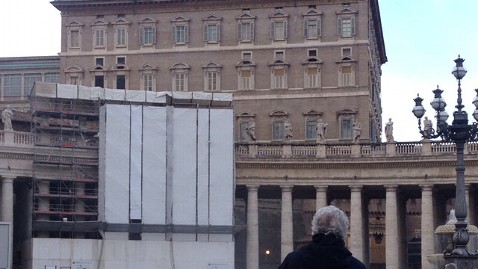What Does Catholic Church Do With an Ex-Pope?

A woman looks up at the papal apartment where the pope lives in Vatican City, Feb. 12, 2013. Image credit: Jeffrey Kofman/ABC News
VATICAN CITY-That didn't take long. Just a day after the Pope's stunning decision to resign there's already a playful joke circulating here in Rome:
Question: What will they call the ex-Pope?
Answer: Ex-Benedict
In case you missed it, the answer is a cute play on the breakfast dish "Eggs Benedict."
Kidding aside, there are a lot of unanswered questions about how the church will deal with a situation that really is without precedent. Sure, popes resigned 600 and 800 years ago, but the situations are, well, hardly parallel. The closest might be Celestine V, known as the Hermit Pope, who resigned in 1294. He had lived in total seclusion and quickly realized he was not equipped to deal with the cut and thrust of 13 th Century Vatican politics.
In his resignation Monday, Benedict XVI acknowledged his own mortal shortcomings: "in order to govern the bark of Saint Peter and proclaim the Gospel, both strength of mind and body are necessary, strength which in the last few months, has deteriorated in me to the extent that I have had to recognize my incapacity to adequately fulfill the ministry entrusted to me."
Standing in front of St. Peters at night, John Thavis, a veteran Vatican journalist and author of the soon-to-published "The Vatican Diaries" said it's impossible to predict how a Pope and a former Pope will co-exist, "there is no job description for a retired Pope."
In his resignation address, Benedict XVI said simply that his life will be "dedicated to prayer." But unlike Celestine V, Benedict XVI will not disappear. He is expected to retire to a convent on the Vatican grounds. He will not take part in the conclave of Cardinals that will elect his successor next month, at least not overtly. But it's impossible to predict what role he will play behind the scenes… if any.
A day after his resignation, St. Peters Square was filled with tourists. Most are not Catholics, they have simply come to see one of the great sites of the world. But amid the crush of cameras and tour groups, I spotted a solitary elderly woman, perched quietly against a post in the middle of the square. She was staring up at the papal apartment, where Benedict XVI has lived for almost eight years. Tears were streaming down her eyes.
I approached tentatively. She was happy to talk - but only in Italian or Spanish. I opted for Spanish. Her name is Caridad - Spanish for "Charity." She told me she is from Spain but she had lived in Rome for 40 years. When I asked what she thought of the Pope's resignation, she told me it was an "act of generosity to the church and the faithful." She loves the pope and she thinks he showed great humility in acknowledging his limitations.
He may also have rewritten his place in the history books. For almost eight years Benedict has struggled to hold back the forces of modernity - refusing to expand the role of women. While he devoted himself to theology, his papacy was marked by scandal: sexual abuse, financial misdeeds and endless leaks about Vatican intrigue. And yet, in his final act he has shown himself to a modernizer in touch with realities of demands of today's world. After witnessing the prolonged decline of his predecessor, John Paul II, Benedict did not want to put the church through another period without a fully functioning leader. He may well believe that it can't afford it.
As we stood in the rain outside St. Peters, John Thavis and I looked up and noted the three lights burning into the night from the papal apartment on the top floor of the building to the right of the Basilica.
"What do you think Benedict is feeling right now?" I asked Thavis.
"Relief," he answered.
And he was not joking.